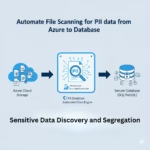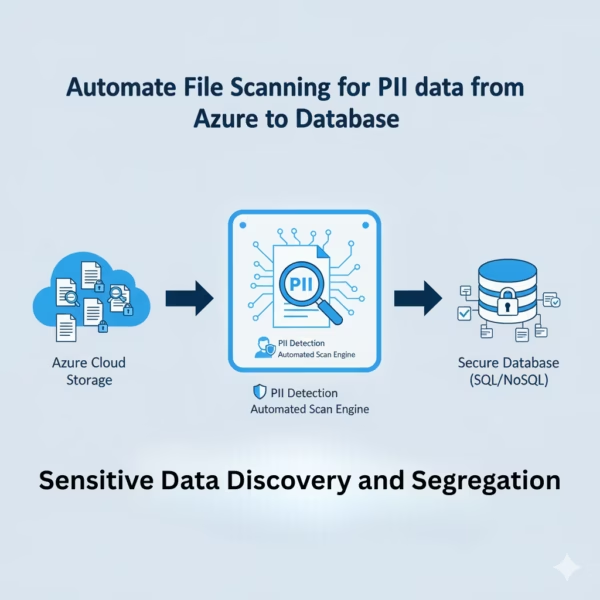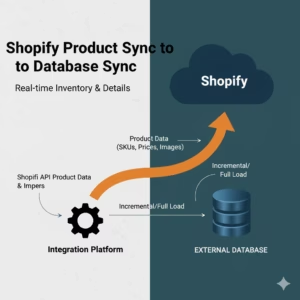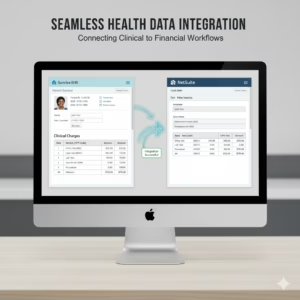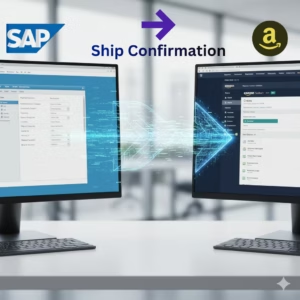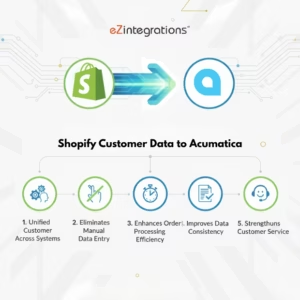Automate File Scanning for PII data from Azure to Database in 3 Easy Steps
$0.00
| Workflow Name: |
PII file scanning from Azure to DB |
|---|---|
| Purpose: |
Detect PII faster and store findings securely in a central database. |
| Benefit: |
Eliminates manual checks and boosts data compliance accuracy. |
| Who Uses It: |
Security teams; Compliance teams; IT admins. |
| System Type: |
Cloud storage + Database systems. |
| On-Premise Supported: |
Yes; supports secure on-prem connectivity. |
| Supported Protocols: |
HTTPS; SFTP; JDBC. |
| Industry: |
Retail, Healthcare, Finance, Technology, SaaS, E-commerce, Enterprise IT, Legal & Compliance |
| Outcome: |
90% faster detection; 100% PII data accuracy |
Table of Contents
Automate File Scanning for PII data from Azure to Database in 3 Easy Steps
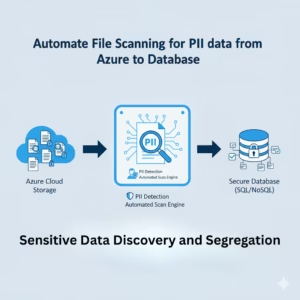
Automate Azure File Scanning to identify PII data in your database. Ensure compliance, improve data security, and reduce manual review.
Product In-Stock: InStock
Description
| Problem Before: |
Manual PII checks were slow; error-prone; and lacked auditability. |
|---|---|
| Solution Overview: |
Automates PII extraction from Azure files and loads reports to DB. |
| Key Features: |
Auto-scan files; detect PII; classify severity; store results in DB. |
| Business Impact: |
Speeds PII detection; reduces breaches; and improves visibility. |
| Productivity Gain: |
Cuts manual review time and boosts team throughput. |
| Cost Savings: |
Reduces labor cost by automating all scanning cycles. |
| Security & Compliance: |
Minimizes data exposure risk by automating detection. |
Automate Azure File Scanning for PII Data
Accelerate PII data identification by automating file scanning from Azure to your database. This no-code workflow ensures sensitive information is detected, categorized, and secured, helping teams maintain compliance while reducing manual effort and errors.
Smart Data Mapping & Validation
Using intelligent data mapping, the system extracts key attributes such as names, emails, social security numbers, and other PII identifiers. It validates, standardizes, and flags sensitive data before updating your database, enabling faster detection, higher accuracy, and robust data governance.
Available on Microsoft Marketplace
eZintegrations automation solutions are available on the Microsoft Marketplace, enabling organizations to easily discover and deploy enterprise-grade workflows within the Microsoft ecosystem. The Marketplace listing simplifies procurement, aligns with Microsoft security and compliance standards, and accelerates adoption for teams automating identity, access, and data synchronization processes. Learn more on the Microsoft Marketplace or visit https://marketplace.microsoft.com/en-us/marketplace/apps?search=eZintegrations&page=1.
Automate File Scanning for PII data from Azure to Database in 3 Easy Steps

Automate Azure File Scanning to identify PII data in your database. Ensure compliance, improve data security, and reduce manual review.
Product In-Stock: InStock
Watch Demo
| Video Title: |
Azure file scanning to database |
|---|---|
| Duration: |
02:32 |
Outcome & Benefits
| Time Savings: |
Cuts scanning time by 80%. |
|---|---|
| Cost Reduction: |
Reduces manual review cost by 60%. |
| Accuracy: |
Improves PII detection accuracy by 95%. |
| Productivity: |
Teams process 10? more files daily. |
Industry & Function
| Function: |
Security; Compliance; Data Governance. |
|---|---|
| System Type: |
Cloud storage + Database systems. |
| Industry: |
Retail, Healthcare, Finance, Technology, SaaS, E-commerce, Enterprise IT, Legal & Compliance |
Functional Details
| Use Case Type: |
Automated PII discovery and reporting workflow. |
|---|---|
| Source Object: |
Azure files (PDF; CSV; TXT; JSON). |
| Target Object: |
PII classification records in DB. |
| Scheduling: |
Hourly or event-based scanning. |
| Primary Users: |
Security teams and compliance officers. |
| KPI Improved: |
PII detection speed and accuracy. |
| AI/ML Step: |
PII ML models classify sensitive data. |
| Scalability Tier: |
Enterprise-grade scalable pipeline. |
Technical Details
| Source Type: |
Azure Blob Storage. |
|---|---|
| Source Name: |
Azure Storage Account. |
| API Endpoint URL: |
https://.blob.core.windows.net/. |
| HTTP Method: |
GET/PUT. |
| Auth Type: |
OAuth2 / Shared Access Key. |
| Rate Limit: |
Azure default throttling applies. |
| Pagination: |
Blob listing continuation tokens. |
| Schema/Objects: |
Order; OrderLine; Customer |
| Transformation Ops: |
Extract; classify PII; map to DB schema. |
| Error Handling: |
Retry; skip corrupt files; error logs. |
| Orchestration Trigger: |
Schedule or event-based trigger. |
| Batch Size: |
100?500 files per batch. |
| Parallelism: |
Multi-threaded scanning. |
| Target Type: |
Database (SQL/NoSQL). |
| Target Name: |
PostgreSQL / MySQL / SQL Server. |
| Target Method: |
Insert/Upsert. |
| Ack Handling: |
DB insert acknowledgement. |
| Throughput: |
Scans thousands of files per hour. |
| Latency: |
Sub-minute processing per file. |
| Logging/Monitoring: |
Central logs + alerts + dashboard. |
Connectivity & Deployment
| On-Premise Supported: |
Yes; supports secure on-prem connectivity. |
|---|---|
| Supported Protocols: |
HTTPS; SFTP; JDBC. |
| Cloud Support: |
Fully cloud-hosted or hybrid. |
| Security & Compliance: |
Minimizes data exposure risk by automating detection. |
FAQ
1. What is the goal of Azure File Scanning for PII?
The goal is to automatically identify and secure sensitive PII data from files in Azure, ensuring compliance and reducing manual review.
2. How does the system detect PII data?
The workflow uses intelligent data mapping, pattern recognition, and validation rules to detect names, emails, social security numbers, and other PII identifiers.
3. Can the scanning run in real time or on a schedule?
Yes. Scans can be performed in real time for immediate detection or as scheduled batch processes for periodic compliance checks.
4. What happens if a file cannot be scanned or matched?
Files that fail scanning are flagged and logged; the system retries automatically or routes them for manual review to ensure no data is missed.
5. Does the platform support large-scale file scanning?
Yes. It can handle high-volume file repositories in Azure while maintaining accuracy, performance, and compliance standards.
6. What are the benefits of automating PII file scanning?
Automation ensures faster detection, improves data security, reduces manual effort, enhances compliance, and provides audit-ready reports.
Resources
Case Study
| Customer Name: |
Global Retailer |
|---|---|
| Problem: |
Manual PII data detection; compliance risks and slow processing |
| Solution: |
Automated Azure file scanning to identify and secure PII data |
| ROI: |
4 FTEs redeployed; 3?month payback |
| Industry: |
Retail, Healthcare, Finance, Technology, SaaS, E-commerce, Enterprise IT, Legal & Compliance |
| Outcome: |
90% faster detection; 100% PII data accuracy |
